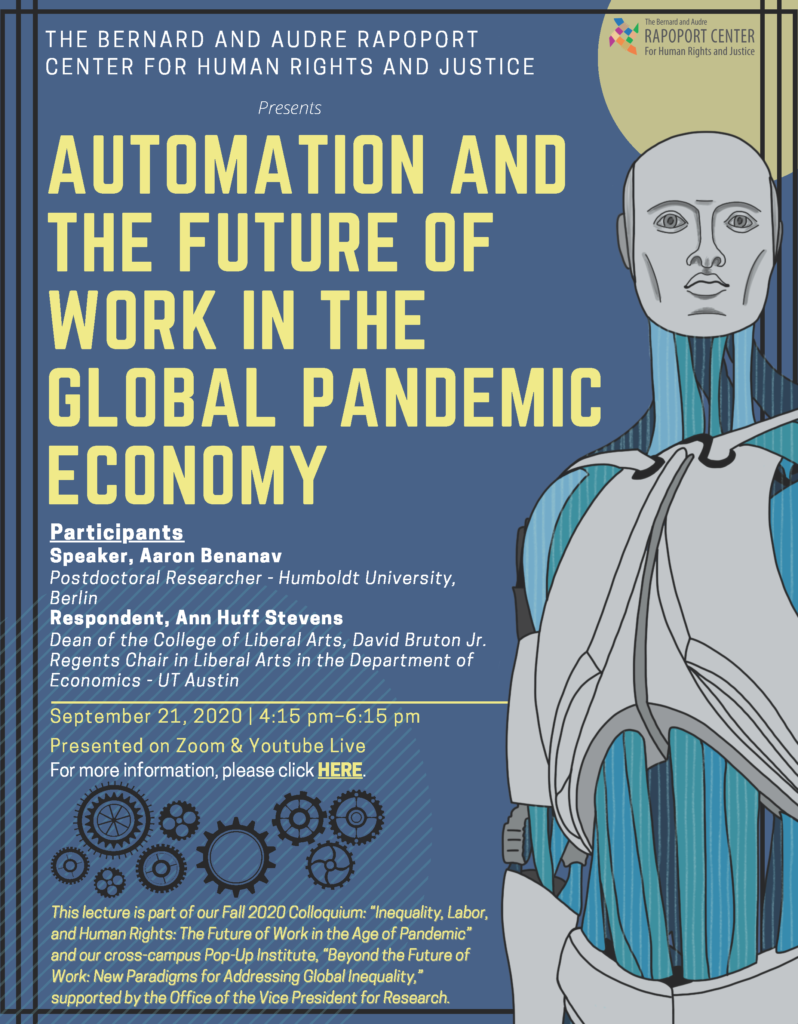
Aaron Benanav: “Automation and the Future of Work in the Global Pandemic Economy”
- Aaron Benanav Postdoctoral Researcher, Humboldt University, Berlin
This was the first lecture in our Fall 2020 Colloquium, “Inequality, Labor, and Human Rights: The Future of Work in the Age of Pandemic,” part of the interdisciplinary and cross-campus Pop-Up Institute, “Beyond the Future of Work: New Paradigms for Addressing Global Inequality,” supported by the Office of the Vice President for Research.
Abstract: Silicon Valley titans, politicians, techno-futurists, and social critics have united in arguing that we are on the cusp of an era of rapid technological automation, heralding the end of work as we know it. The statistical evidence to back up this claim is sorely lacking. Instead of fast rising levels of labor productivity, corresponding to a rapid replacement of labor with machines, we are living through a period of persistent economic slowdown, with a low demand for labor being one of its consequences. This paper revisits and revises macro-historical and macro-sociological accounts of the long-term trajectory of capitalist economies. It presents evidence that economic stagnation is structural rather than contingent, and malignant rather than benign, with major implications for policy proposals and political projects that depend on restarting the engine of economic growth for their success.
Aaron Benanav is an economic and labor historian who holds a postdoctoral researcher position at Humboldt University in Berlin and is the academic coordinator for the research unit, “Re-Allocation,” in the Cluster of Excellence “SCRIPTS: Contestations of the Liberal Script,” a seven-year project funded by the German Research Foundation. His research interests include nineteenth- and twentieth-century global economic history, employment and unemployment, deindustrialization, informality, inequality, labor market dynamics, population growth, and urbanization. Benanav’s first book, Automation and the Future of Work, is forthcoming from Verso Books in fall 2020. He is now working on a second book project on the global history of unemployment since World War II. Before joining Humboldt, he was a Harper-Schmidt Fellow in the Social Sciences Division at the University of Chicago. Benanav holds a PhD and an MA in History from the University of California, Los Angeles, and a BA in History from the University of Chicago.
Ann Huff Stevens is Dean of the College of Liberal Arts and David Bruton Jr. Regents Chair in Liberal Arts in the Department of Economics at the University of Texas. Her research focuses on workers and labor markets, the incidence and effects of job loss across generations, and poverty and safety net dynamics. Her current work examines returns to career and technical education programs, earned income tax credit eligibility and deep poverty, and aspects of rising male non-employment. The founding director of the Center for Poverty Research at UC Davis, she has served as an investigator on numerous grants from agencies including the National Science Foundation, the U.S. Department of Health and Human Services, and the Institute for Education Sciences. She received a B.S. in Economics and Political Science from American University and Ph.D. in Economics from the University of Michigan.
Respondents
- Ann Huff Stevens Dean, College of Liberal Arts and David Bruton Jr. Regents Chair in Liberal Arts in the Department of Economics, University of Texas at Austin
Supporters
Office of the Vice President for Research
